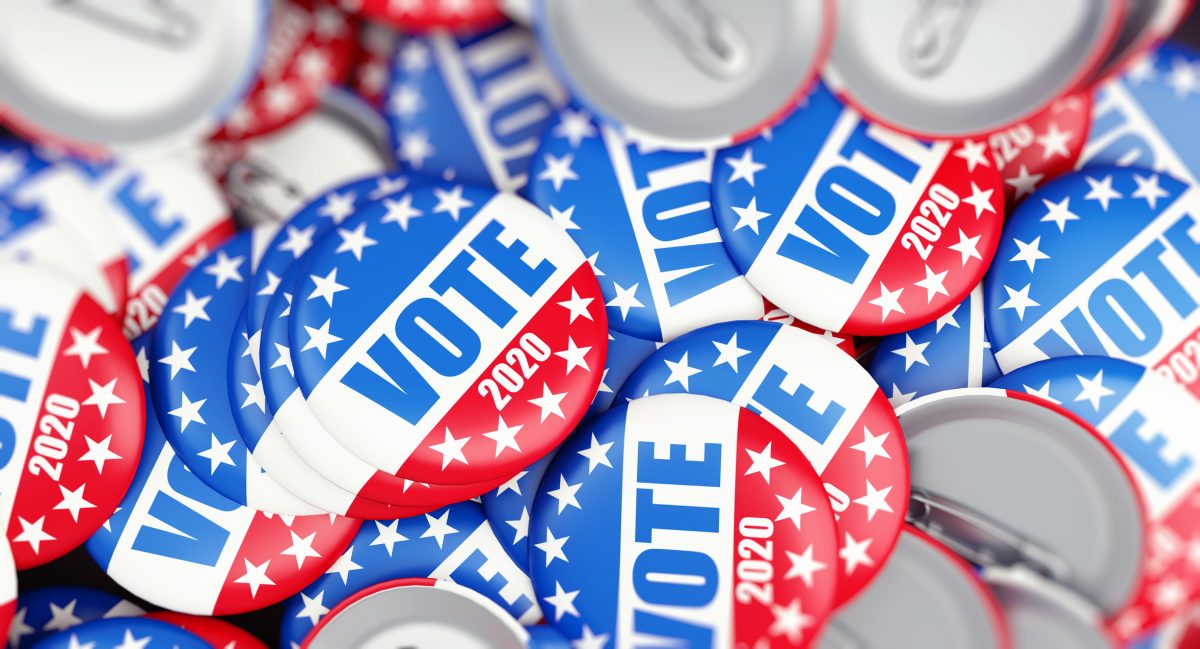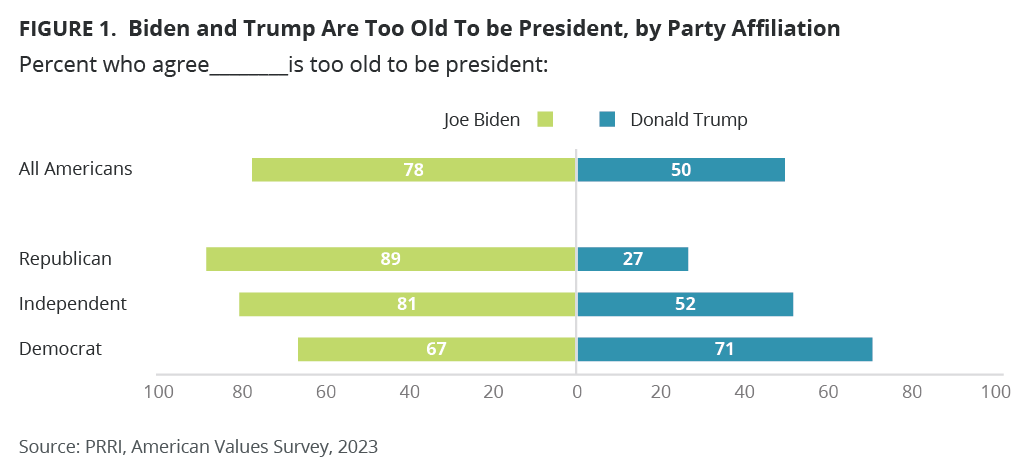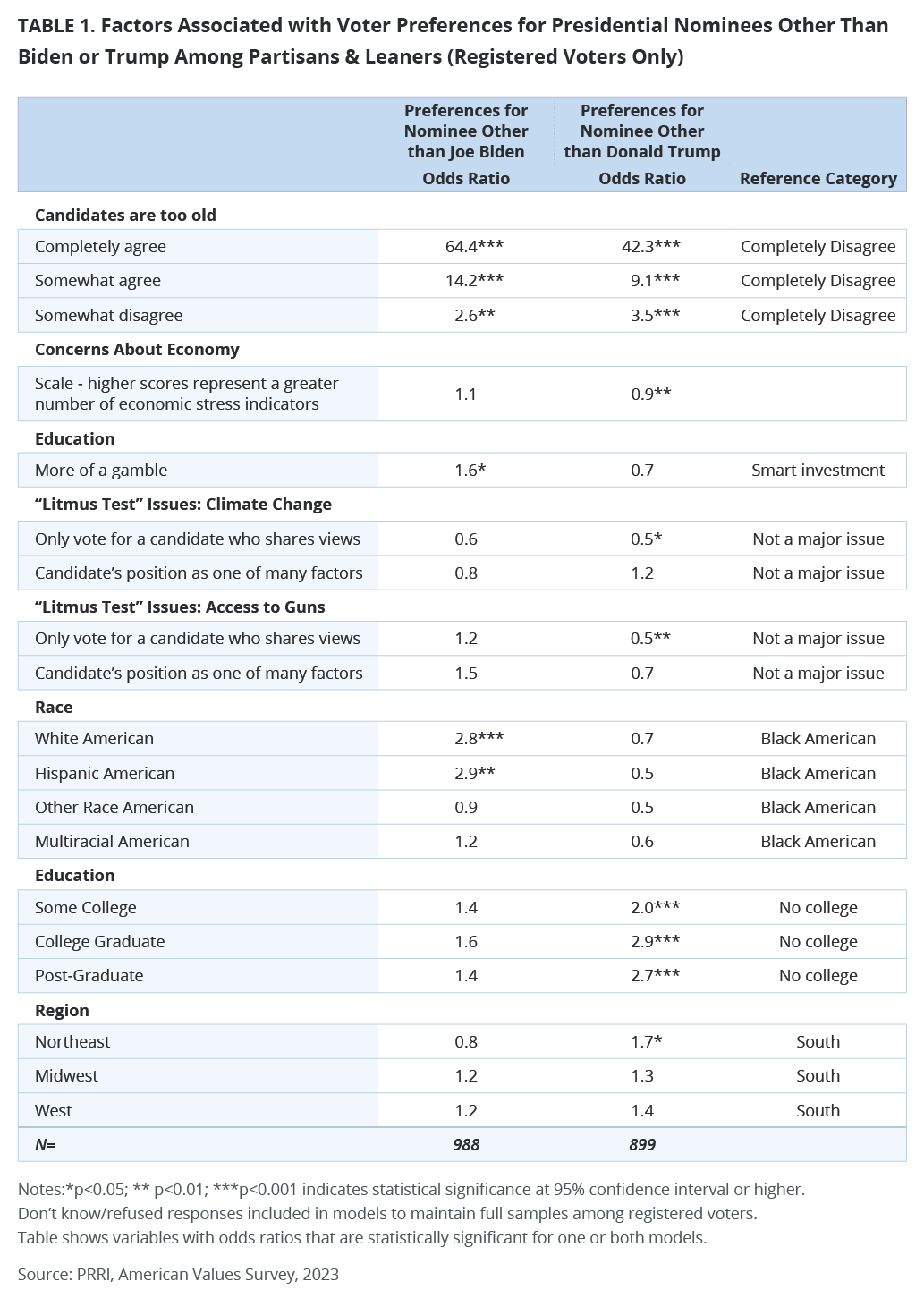The Role of Age and Other Factors in Voter Preferences for Presidential Nominees

Less than a year out from Election Day 2024, both President Joe Biden and former President Donald Trump evoke little enthusiasm among voters. This Spotlight Analysis evaluates those partisans more likely to prefer someone else to be their party’s nominee — and the role of age in driving those attitudes.
Most Americans — regardless of their partisanship — believe that Biden is too old to be president, according to the 2023 PRRI American Values Survey (AVS), released in late October. Nearly 8 in 10 Americans (78%) agree with the statement that Joe Biden is too old to be president, including half who completely agree (50%). Even two-thirds of Democrats (67%) agree that Biden is too old, compared with 81% of independents and 89% of Republicans.
Americans are less likely to think that Trump is too old to be president compared with Biden; half of Americans (50%) agree with the statement that Trump is too old to be president, while 47% disagree. Partisanship colors those views, however: roughly one-quarter of Republicans (27%) agree that Trump is too old, compared with 52% of independents and 71% of Democrats.

The 2023 AVS also finds that two-thirds of Democratic voters and independent voters who lean toward the Democratic party say they would prefer someone other than Biden to be their party’s nominee (64%), compared with one-third (34%) who say they would prefer Biden to be the nominee. Similarly, most Republicans and Republican-leaning independent voters say they would prefer someone other than Trump to be their party’s nominee (52%).
To isolate the effect of candidate age in driving registered voters’ preferences for alternative nominees, we conducted a multivariate analysis. In addition to voters’ attitudes about whether they believe Biden or Trump are too old to be president, respectively, our models also control for a range of socioeconomic and political characteristics of registered voters, such as: race and ethnicity, age, education, gender, area of residency, and region, as well as their views on the economy and issue voting preferences.
Our analysis finds that the ages of Biden and Trump, respectively, lead partisan and partisan-leaning voters to strongly express a preference for alternative candidates to be their parties’ nominee — although this effect is larger among voters who are Democrats/Democratic-leaners than among voters who are Republican/Republican-leaners.
The Biden model shows that Democratic and Democratic leaning voters who completely agree with the statement “Joe Biden is too old to be president” are 64 times as likely as those registered voters who completely disagree to prefer another candidate as their party’s nominee. Those who “somewhat agree” that Biden is too old to be president are still 14 times as likely as those who completely disagree to prefer an alternative nominee.
Republican and Republican-leaning independent voters who completely agree with the statement “Donald Trump is too old to be president” are 42 times as likely as those who completely disagree to prefer another candidate as their party’s nominee in our Trump model. Those voters who somewhat agree that Trump is too old are also more likely to prefer someone else to head the top of their presidential ticket.
Concerns about the economy weigh far less in the minds of voters who are Democratic/ Democratic leaners than for Republicans/Republican leaners in terms of preferring alternative nominees for the top of their tickets. We asked Americans about several indicators of increased economic stress, such as whether they were worried about not having enough money to retire, or being unable to afford health care, housing, everyday expenses such as groceries or gas, or get a job that pays a living wage. Combining all these measures into a scale, we find that as economic stress increases among Republican and Republican-leaning registered voters, they are less likely to prefer another nominee in the Republican ticket. Yet, the perceived economic conditions faced by Democratic voters do not appear to affect their desire for a different nominee than Biden.
Attitudes about the utility of college education are also linked to the desire among partisan voters to want alternative presidential nominees. Democrat and Democrat-leaning independent registered voters who say that education is a gamble are about twice as likely as those who say it is a smart investment to prefer another candidate than Biden as the party’s nominee.
Racial self-identification is the only demographic factor that matters among Democrats and Democrat-leaning independent voters who prefer other nominees than Joe Biden. White and Hispanic Democrats (and leaners) are about three times as likely as Black Democrats (and leaners) to want an alternative to Biden, showing that Black Democrats remain among Biden’s most loyal supporters.
Race and ethnicity do not factor into Republican voter preferences for a Trump alternative, though education and region of residency do. Republican and leaners who hold higher levels of education are at least twice as likely as those who hold a high school education or less to prefer someone other than Trump as their party’s nominee. Similarly, Republican and Republican-leaning independents who live in the Northeast are nearly twice as likely as those who live in the South to prefer another nominee than Trump.
We asked Americans whether they would only vote for candidates who shared their views on abortion, climate change, access to guns, LGBTQ rights, and immigration. None of those “litmus test” issues factored into the desire among Democratic voters to express a preference for a Biden alternative.
However, Republican and Republican-leaning registered voters who say that they will only vote for a candidate who shares their views on climate change and access to guns are half as likely as those who don’t view these as major issues to prefer another nominee on the Republican ticket.

In short, among Democrats our multivariate analysis suggests that a desire for an alternative to Joe Biden as their party’s nominee is not largely driven by dissatisfaction with Biden’s policies nor because Democrats and Democratic-leaning independents blame him for his performance on the economy — instead, Biden’s age is the primary reason many Democrats and Democratic-leaning independents would support an alternative candidate to run for President for their party.
This finding is also supported by another measure on our American Values Survey. Our survey asked partisans in an open-ended response among those who expressed a preference for someone other than Biden or Trump why they sought someone else. Among Democrats and Democratic-leaners, nearly 70% of these open-ended responses mentioned Biden’s age or a desire for younger leadership.
Age also matters among Republicans and Republican-independent voters when it comes to preferring a new nominee for president — but other factors also matter for such voters, including whether they have a college degree. Republican voters who agree with Trump about guns and climate change are also very loyal to his candidacy compared with those who do not.
Moreover, unlike the case with Biden, when we asked Republicans and Republican-leaners in our American Values Survey why they prefer an alternative nominee to Trump, most did not cite his age in open-ended responses. These voters were just as likely or more likely to express concerns about his legal woes, his bombastic and polarizing communication style, or the “baggage” his candidacy brought, as reasons to prefer a different presidential nominee.
Of course, although many voters expressed a desire for different nominees in our survey, as we enter 2024, the probability that alternatives will emerge for either major party are getting slimmer.

